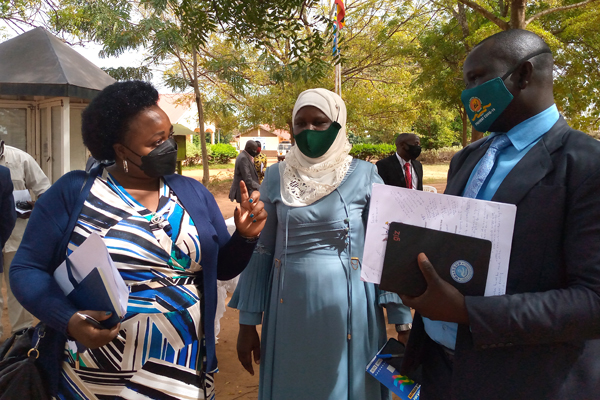People with HIV in Bidibidi ask govt for nutritional aid

Ms Sarah Kayagi, the chairperson of the Parliamentary Committee on HIV (left), chats with Ms Naima Melsa Avako, the Yumbe Woman MP, and Mr Abdul Mutwalib Asiku, the Yumbe chairperson, last week. PHOTO/ROBERT ELEMA
What you need to know:
- They say many are from vulnerable families which cannot support them.
People living with HIV/Aids in Bidibidi refugee settlement in Yumbe District have asked government to support them with more nutritious food than the one they receive from the World Food Programme (WFP).
They made the request during an interaction with the Parliamentary Committee on HIV/Aids at the weekend.
The committee visited the settlement to ascertain the impact of Covid-19 on people living with HIV/Aids.
Mr Alphonse Taban, one of those living with HIV/Aids, said since their arrival in Bidibidi settlement in 2016, there has been no additional support for those living positively in the settlement.
He said in South Sudan, people living with HIV/Aids are given a lot of food support.
“We have been crying for additional food support so that it gives us strength when we take our drugs but have never received any. I don’t know whether it is the law of Uganda that is barring us from getting such support. We only rely on food rations given by WFP and other humanitarian agencies,” Mr Taban said.
He added: “We are unable to help ourselves because we are disabled. We can’t look for something to eat.”
He said there is also need for government to create projects that will boost their livelihoods and provide vocational skills training so that they are able to fend for themselves.
Mr Ratib Embaga, another person living with HIV/Aids, said the Covid-19 induced lockdown affected their movement thus accessibility of the drugs became a problem.
“Some of the people living with HIV/Aids shunned health facilities for fear of being subjected to Covid-19 tests and being quarantined. Some of the refugees, who are living positively, used to get support from relatives in other areas but accessibility became a problem,” he said.
Ms Beatrice Abaru, the coordinator of Yumbe District People Living with HIV/Aids Network said, many of their people come from vulnerable families which cannot support them.
“When you are making policies, think of the population of persons living with HIV/Aids. We are just hustling with life and with the stigma that exists in the community, some of the people are not disclosing their status,” she said.
Mr Manisour Abasi, the Yumbe District HIV/Aids focal person, said HIV counselling services uptake were slightly affected in the first Covid-19 induced lockdown.
“We continue to grapple with retention of clients on care. A total of 351 clients missed their appointment in the first lockdown in March 2020 due to transport challenges,” he said.
He added: “The retention is mostly affected by mobile clients including migrant refugees, labourers, sex workers, truck drivers, uniformed personnel who undergo regular transfers and a significant number of refugees.”
Ms Naima Melsa Avako, the district Woman MP, said: “Most of the problems associated with people living with HIV/Aids are related to livelihood, economic empowerment, and skilling. We are advocating for a special budget for the HIV/Aids. We have support from Uganda AIDS Commission and soon we shall meet the President to back up support for the budget.”
Ms Sarah Kayagi, the chairperson of the Parliamentary Committee on HIV/Aids, said despite the creation of many administrative units in the district, some people still move about 10 kilometres to access health services.




